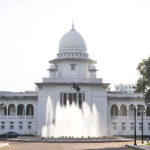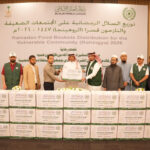BSS, SANGSAD BHABAN: Finance Minister Abul Hassan Mahmood Ali today placed a Taka 7,97,000 crore national budget for the coming fiscal with a prime focus on maintaining economic stability and augmenting steps to materialise the government’s “Smart Bangladesh” vision.
The proposed budget during the new tenure of Prime Minister Sheikh Hasina’s government tended to contain inflation as it appears to be major challenge in the existing global and domestic scenario.
“(But) this land, hallowed by immeasurable sacrifice and selflessness, has repeatedly stood resilient against all odds with unwavering conviction leveraging the collective endeavors of the people,” he said.
The Finance Minister said un-daunting people of Bangladesh are today the brave warriors of the irresistible march towards progress, awakened by the spirit of the great Liberation War.
Ali announced that the vision of ‘Smart Bangladesh’ would be realised through the integration of cutting-edge technologies like artificial intelligence and emphasised four key pillars – Smart Citizens, Smart Economy, Smart Government, and Smart Society.
The finance minister started placing the budget at 3 pm at the Jatiya Sangsad in presence of the Leader of the House and Prime Minister Sheikh Hasina while Speaker Dr Shirin Sharmin Chaudhury chaired the budget session.
The 210-page budget speech titled “March Towards Smart Bangladesh Following the Path of Sustainable Development” highlighted 11 chapters including one for the pledge for building happy, prosperous, developed and smart Bangladesh.
Attired in a suite Ali delivered his maiden budget speech spanning nearly one and a half hour also proposing measures to maintain macroeconomic stability and enhance revenues amid the global uncertainties.
“The budget for the FY2024-25 has been prepared with a firm commitment to sustaining this trend in the future,” he said.
This is the country’s 53rd budget and the 25th of the Awami League (AL) government in six terms. This budget is also the 21st under the rule of Prime Minister Sheikh Hasina in different terms.
Tajuddin Ahmad presented the country’s first budget as finance minister of the post-independence Bangabandhu government in 1972.
Ali said considering the current global political landscape and the state of the domestic macro economy, the government decided to take time-befitting fiscal sector reforms like digital transformation, tax net expansion and collection of non-tax revenue.
He, however, said administrative capacity was needed to be ensured for adequate resource mobilization.
A career diplomat by background Ali, who previously served as ministers for Disaster Management and Relief and Foreign Affairs, eyed for building a ‘Smart Bangladesh’ despite various obstacles and adversities.
Ali projected that under ‘Smart Bangladesh’, the country’s per capita income would reach at least $12,500, with less than 3 percent of the population living below the poverty line, and extreme poverty eradicated.
Despite the global volatile condition and adversities, Ali eyed a 6.75 percent GDP growth while containing the inflation at 6.50 percent.
The general point to point inflation is still hovering slightly below the double digit mark albeit various efforts from the government to tame it.
The proposed budget size of Taka 7,97,000 crore is 4.60 percent or around Taka 35,215 crore higher than the budget of the outgoing fiscal FY24). The country’s GDP size has been estimated at Taka 55,97,414 crore.
The government, however, has reduced its expenditure by Taka 47,367 crore in the revised budget for the outgoing fiscal 2023-24, bringing it down to Taka 714,418 crore.
In the budget for FY24, total government expenditure was estimated at Taka 7,61,785 crore.

Regarding inflation, Ali said, “Inflation is one of our main challenges at present. To control inflation, we gave highest priority on decreasing demand and increasing supply in the past two budgets.”
In this context, he said to achieve macroeconomic objectives, supportive fiscal policies, such as reducing budget expenditure, discouraging less important expenditures and various austerity measures have been adopted alongside pursuing a contractionary monetary policy.
Despite these measures, inflation in the country remains persistently above 9 percent primarily due to import-induced price increases and disruptions in the domestic supply chain, he noted.
“Therefore, we will follow fiscal consolidation as well as the reduction of the budget deficit, and will continue budget belt-tightening measures, even if on a limited scale in the budget for the upcoming fiscal year,” Ali added.
Given all these reforms and initiatives to augment revenue collection, a total of Taka 5,41,000 crore revenue income has been estimated for FY25, which accounts for 9.7 percent of the GDP.
Of which, it is proposed to collect Taka 4,80,000 crore through the National Board of Revenue, and Taka 61,000 crore from other sources.
Apart from already approved Annual Development Programme (ADP) outlay of Taka 2,65,000 crore, the proposed budget saw an estimated deficit of Taka 2,56,000 crore excluding grants. If the grants are considered, then the overall budget deficit stands at Taka 2,51,600 crore.
As the government wants to lower expenses, it eyes to contain the budget deficit to 4.6 percent of the gross domestic product in the next fiscal year. The government usually keeps the budget deficit at around 5 percent.
In the current fiscal year (FY24), the budget deficit is Taka 2,61,785 crore.
Apart from the original ADP allocation of Taka 2,65,000 crore, Taka 5,943 crore has been allocated for schemes, Taka 7,627 crore for special projects outside the ADP and Taka 2,884 crore for the food for work programme.
For the upcoming FY25, the budget size has been estimated to be Taka 7,97,000 crore, which is 14.2 percent of the GDP. A total of Taka 5,32,000 crore is proposed to be allocated for other expenditures including operating costs.
While allocating resources, emphasis has been given on the resource allocations for the ADP for investment and development of physical infrastructure.
In the proposed budget, a total allocation of Taka 2,06,569 crore has been proposed for the social infrastructure, which constitutes 25.92 percent of the total allocation. For physical infrastructure, an allocation of Taka 2,16,111 crore has been proposed, which constitutes 27.12 percent of the total allocation.
For common service sector, an allocation of Taka 1,68,701 crore has been proposed, which comprises 21.17 percent of the total allocation. It is worthy of note that since 2022, the interest rate has been gradually increased with the aim of controlling inflation in the western world.
“As a result, we also had to increase the interest rate in our country, and simultaneously, there has been a significant depreciation of the currency against the US dollar,” he added.
In the budget for FY25, the expenditure on interest payments may increase significantly in this context. Therefore, a total of Taka 1,13,500 crore has been allocated for this purpose, which constitutes 14.24 percent of the total allocation.
In the proposed budget for FY25, the estimated deficit will stand at Taka 2,56,000 crore, which is 4.6 percent of GDP. The deficit was estimated to be 5.2 percent in the previous budget. “Within the total proposed budget deficit, I propose Taka 1,60,900 billion from domestic sources and Taka 95,100 billion from foreign sources for financing”.
The Finance Minister said emphasis will be laid on the following activities to transform Bangladesh into a developed, prosperous and smart country by 2041.
These include maintaining economic stability; ensuring an educational environment conducive to science education, scientific research and innovation, providing necessary support to agriculture sector and ensuring food security; improving and expanding basic health services; using technology at all levels including digitizing all possible services; developing physical infrastructure; optimising utilization of marine resources; ensuring disciplines in the financial sector; eliminating extreme poverty by 2031 and lowering general poverty rate to 3 percent by 2041; taking steps to combat the effects of climate change; continuing zero tolerance policy against corruption.
While maintaining the budget deficit at a manageable level, reliance on external sources for deficit financing will be reduced.
“To control inflation, austerity measures will be maintained on a limited scale, but the scope of safety net programmes for low-income individuals from the pressure of high inflation will be expanded,” he added.
In this year’s budget, depending on the facilities given and withdrawn, prices of products may increase and decrease.
Prices may go up for phone and internet services; oils; cigarettes; CNG conversion kits, and cylinders; power plants; establishments at economic zones; air conditioners and refrigerators; water filters; LEED bulbs; cashew nuts.
Besides, prices may also increase for products such as ice cream, carbonated beverages, amusement parks, theme parks, and tourism services as the ministry also proposes VAT on these sectors.
Prices may go down for essential commodities as the import duty of 30 essential commodities including rice, edible oil, sugar, chickpeas, milk and wheat have been proposed to be reduced.
The prices of other products which may go down include aircraft engines & propellers; powdered milk; chocolates’ laptops, motorcycles; dengue test kits; kidney treatment; cancer treatment; carpets; electric motors; methanol.
Besides, taxpayers, including companies and firms, with black money in Bangladesh have again gained the opportunity to legalise their undeclared wealth without having to face any questions about the sources of their income next fiscal year.
According to the proposed provision, no authority can raise any question if any taxpayer, including companies, pays a 15 percent tax on cash, bank deposits, financial securities, or any other forms of wealth.
Furthermore, they will have to count a specific tax on properties — land, buildings, flats, or commercial spaces — to whiten their wealth.
Besides, the ceiling of tax free income of the individual taxpayers has remained the same at Taka 3.50 lakh while the government is all set to curtail corporate income tax by 2.5 percentage points in a bid to encourage compliance with a condition of promoting cashless transactions.
Ali today proposed the 25 percent corporate tax to replace the existing 27.5 percent for non-listed companies, subject to one condition.
The Finance Minister said alongside controlling inflation, the budget for this fiscal year has been formulated with an emphasis on ensuring necessary funding for government priority sectors such as poverty alleviation, job creation, social safety net programs, education, health, agriculture, and climate change impact mitigation, thereby prioritizing future development trajectories.
Meanwhile, a Finance Ministry press release said that to make the budget more participatory, all the budget documents have been uploaded into the websites of the Finance Division www.mof.gov.bd the NBR www.nbr.gov.bd while anyone can read and download these documents while browsing those websites.
Besides, anyone from home and abroad can send their opinions and recommendations on budget through the email budgetfeedback@finance.gov.bd.
The Finance Minister will hold a post-budget press conference tomorrow at 3:00 pm at the Osmani Memorial Auditorium in the capital.






